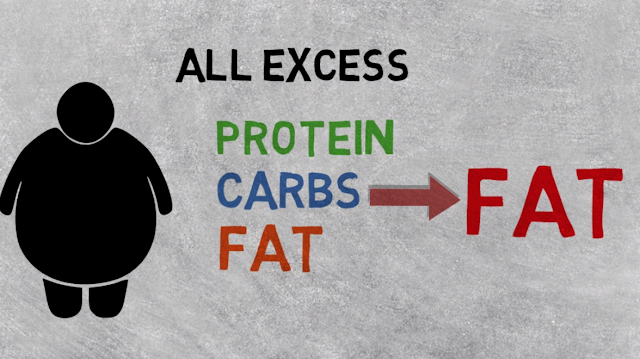Fats,
probably not the first word you want to hear when thinking about health. You're
probably more used to hearing fat in the same sentence of words like heart
disease, obesity, high cholesterol, and clogged arteries.
Fat's reputation is
pretty bad compared to everything else we eat, but what is fat exactly? The
fats that you eat and store in your body is known as triglycerides.
Triglycerides are compounds consisting of glycerol as the backbone that holds
together three fatty acid chains.
And just like
carbohydrates and protein, fat is a macronutrient and by the far the most dense
macro. Each gram of protein and carb contains 4 calories, but a gram of fat is more
than double at 9 calories per gram.
But that's a
good thing as far as energy production. The Gycerol in a Triglyceride can be
metabolized into the carb Glucose and a glucose molecule via Glycolysis produces
2 energy molecules called ATP. Fatty acids go through a process called Beta-Oxidation
that produces Acetyl CoA. This molecule is further metabolized into energy
through a very complex process called Oxidative-Phosphyloration, resulting in
12 ATP molecules generated, 6 times more than glycolysis. And the longer these
fatty acid chains are, the more Acetyl CoA can be produced.
The only catch, Oxidative-Phosphyloration
takes a long time, 100 times longer than glycolysis. That's good news for exercises
that aren't too intense such as jogging and swimming, but its effectiveness is
restricted during sprinting and weightlifting.
It also explains why aerobic
exercises in general are touted for its fat burning properties.
There are two
types of fats known as saturated fats and unsaturated fats. Saturated fats get
their name from being fully saturated with hydrogen atoms because its carbon
only have single bonds, which also makes it solid in room temperature.
Unsaturated fats have double bonded carbon atoms that prevent full hydrogen
saturation. Some have a single double bond, called monounsaturated fats, and
some have more, called polyunsaturated fats.
Saturated fats are typically seen as the bad
fat, being connected to increased LDL cholesterol, or bad cholesterol. But
there is no research directly indicating these claims, but what was found is
that whenever unsaturated fats are consumed in replacement of saturated fats, overall
heart health is improved. Unsaturated fats are indeed better. One of the most
popular unsaturated fats are omega-3 fatty acids, which have been linked to
lowering fat storage, reducing depression, reducing ADHD symptoms, reducing
blood pressure, increasing good, HDL cholesterol levels, and much more.
But not
all unsaturated fats are good. Trans fat is also an unsaturated fat. The big
difference is the structure of the double bonds. In a standard unsaturated
fatty acid, the hydrogen on the double bond are on the same side. These are
called CIS fats. A trans-fat has the hydrogen atoms attached on the opposite
sides of the double bond.
This small, but extremely important difference,
causes the fat to be very dangerous for your health with links to not only
significantly increasing bad cholesterol in your body but also direct links to
coronary heart disease. Trans fat has been deemed to be so bad that in 2015,
the US Food and Drug Administration required that all food manufacturers must remove
trans fat in the form of partially hydrogenated
oils, completely from their products by 2018. If you're still eating foods
containing trans fat, it's probably time to stop.
Fat should
make up roughly 15 to 30 percent of your daily calories, which is about 30 to
60 grams per day. If you're concerned about
saturated
fats, a good idea is to replace them with healthy unsaturated cis fats, such as
the fats found in fish and fish oil.
And in case you're wondering, the fat stored
in your body doesn't only come from eating fat. All excess calories, whether
it's from proteins or carbs, will be processed and stored as fat in your body.
At the end, it's all about how many calories you consume versus the amount of
calories you burn.
Oh, and you can't turn fat into muscle, sorry.
Sources:
What is Protein?Explained.
How to build peak of your bicep?
How to increase width of you biceps?
How to lose fat?
















After studying your article you have to understand what I actually have written here.icd 10 chronic low back pain This one is being written once you have a proposal from you.
ReplyDelete